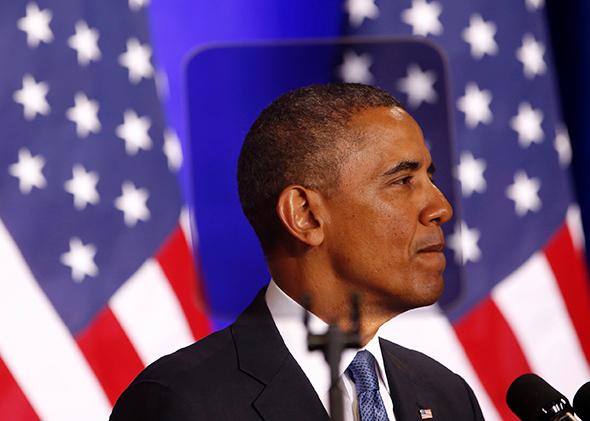On Friday President Barack Obama called for mild reform of the National Security Agency’s phone records collection program. In the words of Rep. Justin Amash, “the government will continue to search those [phone] records without a warrant—but just a little less vigorously.” The phone records program, which is based on Section 215 of the Patriot Act, is only one of many that have been revealed over the last six months; it does not include the NSA’s hacking into email accounts en masse, collecting millions of text messages daily, or paying off encryption companies to put back doors into their algorithms. So Obama’s speech only touched on a fraction of the concerns at hand. (There’s also the issue of how the NSA itself fell prey to one of the biggest security breaches of all time.) By not even addressing the full scope of NSA practices, Obama’s speech was destined to be a canary in the national security coal mine.
Yet even on their own terms, Obama’s recommendations on Section 215 are pretty weak, resisting most of the moderate reforms suggested by his own review panel. Obama even managed to water down his own words from last August. Instead of an adversarial lawyer being present in the FISA court, which he endorsed then, he now wants “a panel of advocates from outside government to provide an independent voice in significant cases before the Foreign Intelligence Surveillance Court.” Former FISA Judge James Robertson himself said, “This process needs an adversary,” not an advisory panel on a handful of cases.
Here are a few questions Obama did not answer in enshrining the status quo:
1. How useful has Section 215 metadata actually been? In June, NSA head Keith Alexander said that surveillance of phone and Internet records had foiled “dozens of terrorist events,” but the White House’s advisory committee says the metadata was wholly “inessential,” and Judge Richard Leon said that the number was closer to zero.
2. Does the secret FISA court conduct meaningful oversight? The FISA court, which will remain the gatekeeper for access to the records, has no adversarial process and a 99 percent approval rate for warrant requests. It consists of 11 judges hand-picked by Chief Justice John Roberts, with whom Obama claims to disagree on many things. All but one of those judges are Republican appointees.
3. Why should we be reassured by Obama’s reliance on a fuzzy and tendentious metadata/data distinction? We know the NSA is bulk-collecting data in the case of email and text messages. And Leon recently issued an opinion declaring that collection of metadata is probably as much a Fourth Amendment violation as any other.
4. Will there be any oversight for the government’s issuing of national security letters? These secret letters demand information on users from companies on pain of prosecution. Obama threw this issue to Congress without making any recommendations or changes.
5. Does anyone care that by all appearances, Director of National Intelligence James Clapper and Alexander perjured themselves to Congress? Or does the rule of law only apply to Edward Snowden?
6. Why should we trust the NSA to be honest with Congress and the American people now, when we couldn’t before? Why should we trust them to be competent, when we don’t even know how badly they’ve screwed up until a Snowden comes along to tell us?
Sen. Ron Wyden, one of the few congressional voices to express real concern over the NSA programs, was unimpressed by Obama’s speech. “We must all remember that the very act of bulk collection of private data undermines Americans’ constitutional rights,” Wyden said. That was the charge that Obama should have answered on Friday, but our president, who was once a scholar of constitutional law, barely spoke to it. Instead, he begged off with some cosmetic changes and turned a blind eye to the abuses of the very same agency that spied on Martin Luther King. Remember that: History will not be kind.
